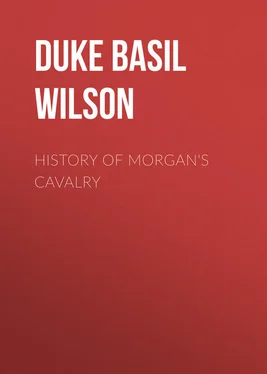Basil Duke - History of Morgan's Cavalry
Здесь есть возможность читать онлайн «Basil Duke - History of Morgan's Cavalry» — ознакомительный отрывок электронной книги совершенно бесплатно, а после прочтения отрывка купить полную версию. В некоторых случаях можно слушать аудио, скачать через торрент в формате fb2 и присутствует краткое содержание. Издательство: Иностранный паблик, Жанр: foreign_antique, foreign_prose, на английском языке. Описание произведения, (предисловие) а так же отзывы посетителей доступны на портале библиотеки ЛибКат.
- Название:History of Morgan's Cavalry
- Автор:
- Издательство:Иностранный паблик
- Жанр:
- Год:неизвестен
- ISBN:нет данных
- Рейтинг книги:3 / 5. Голосов: 1
-
Избранное:Добавить в избранное
- Отзывы:
-
Ваша оценка:
- 60
- 1
- 2
- 3
- 4
- 5
History of Morgan's Cavalry: краткое содержание, описание и аннотация
Предлагаем к чтению аннотацию, описание, краткое содержание или предисловие (зависит от того, что написал сам автор книги «History of Morgan's Cavalry»). Если вы не нашли необходимую информацию о книге — напишите в комментариях, мы постараемся отыскать её.
History of Morgan's Cavalry — читать онлайн ознакомительный отрывок
Ниже представлен текст книги, разбитый по страницам. Система сохранения места последней прочитанной страницы, позволяет с удобством читать онлайн бесплатно книгу «History of Morgan's Cavalry», без необходимости каждый раз заново искать на чём Вы остановились. Поставьте закладку, и сможете в любой момент перейти на страницу, на которой закончили чтение.
Интервал:
Закладка:
"Give me that pistol," Morgan said quietly; and, taking it, much to the fellow's surprise, "I am Morgan."
The consternation of the operator was extreme, and his apology, when he found his tongue, polite. It was accepted, and so was he and placed under guard. He was badly scared, at first, but he was treated kindly, and in a few days became domesticated and even playful. An engine and a few cars, found standing at the depot, were taken possession of – the cars were immediately burned. Morgan got on the engine with two or three companions, and run some miles up the railroad to visit two or three points of interest. He desired especially to ascertain if the tunnel could readily be destroyed, but found that it would be a work of more time than he had to spare. While he was absent, several Federal officers and soldiers came into the town and were made prisoners. When he returned, the engine was run off the track, over a steep bank, and destroyed. On the next morning he sent the bulk of his command across the river again, with instructions to remain near and guard the ferry. He, himself, with ten or fifteen men, remained at Gallatin two days longer with the hope of catching some of the trains. He was disappointed, the news got around and none came. Twenty or thirty wagons which were coming from Scottsville, under a small guard, were also turned back – the escort getting the alarm after he had made all his preparations to capture them – so that his expedition was more barren of the spoils of war than he had hoped. But his main object – to persuade the enemy that they could never safely count upon his being "gone" – was perfectly accomplished. While his men on the south side of the river were waiting for him, six transports, loaded with troops from Monticello, passed down toward Nashville. The men on the boats did not know who the cavalry were, and our men were afraid to fire upon them, lest they might endanger Captain Morgan and their comrades with him, on the other side. Immediately after his return to Murfreesboro', he set out to rejoin the army, and met at Shelbyville that portion of his command which had been encamped on the Shelbyville and Nashville road, and which, in obedience to his orders, had also repaired to the former place.
Here we remained for two or three days and then marched on in the track of the army. While at Shelbyville, the first and only causeless stampede of our pickets and false alarm to the camps which occurred during our squadron organization, took place. Ten or fifteen men were posted on picket some eight miles from the town toward Nashville, near a small bridge, at the southern end of which the extreme outpost vidette stood. From tales told by the citizens, these pickets had conceived the idea that the enemy contemplated an attack to surprise and capture them, and (perhaps for the very reason that they had so often played the same game themselves) they became very nervous about it. Late in the night, two men came down the road from toward Nashville in a buggy, and drove rapidly upon the bridge without heeding the vidette's challenge – he, taking them to be the enemy, shot both barrels of his gun at them and fled to alarm the other videttes and his comrades at the base. The whole party became so alarmed by his representation of the immense number and headlong advance of the enemy, that, without stopping to fight or reconnoiter, they all came in a hand-gallop to camp. The officer in charge sent the vidette who had given the alarm, in advance, to report to me. I immediately got the command under arms and then questioned him. He stated that the enemy's cavalry came on, at the charge, in column of fours, that they paid no attention to his challenge, and that when he fired, they dashed at him, making the air ring with their yells and curses. He said that "the road seemed perfectly blue for more than half a mile," so great was their number.
It was a moonless night, and a slight rain was falling, making the darkness intense. I asked him if he might not have been deceived and if he was not scared. "No, sir," said he, "not a bit, but I was somewhat arrytated ."
Leaving Shelbyville, we marched through Fayetteville to Huntsville; every where along the route the people flocked to see Morgan, and his progress was one continual ovation. When we reached Huntsville, the most beautiful town in Alabama (and now that Columbia is in ashes) perhaps in the entire South, we were received with the kindness and hospitality which characterize that generous, warm-hearted population. Huntsville, the birth-place of Morgan, greeted him like a mother indeed. For ten days we remained there; every man in the command the recipient of unwearying attention. It was very injurious to good soldierly habits, but served, as many other such instances did, to show the men that they were fighting for a people who loved to be grateful, and to prove it – and unavailing as the struggle was, it is still a thought of pride and satisfaction, that the labors and sacrifices were made for a people worthy of them all.
Crossing the Tennessee river at Decatur and marching just in the track of the army, we reached Byrnesville, a few miles from Corinth, on the third of April, and found there the division of General Breckinridge, to which we were attached. The whole army was then astir, and forming to march to attack the enemy who lay at Pittsburg Landing on the southern bank of the Tennessee some twenty miles from Corinth.
Morgan's services were much talked of, and he was complimented by General Johnson in terms that were very grateful to him. He was given the commission of Colonel, to take effect from the fourth of April, and he received (what he valued much more highly) an assurance, or what he construed to be such, that he would be permitted to act independently again, and follow his favorite service with a stronger force and upon a larger scale.
None among the many ardent and high-strung men who went with so much zeal into that fight, felt more hope and enthusiasm than Morgan, for he saw beyond it, a career of excitement, success, and glory, that might satisfy the most energetic and most daring nature.
CHAPTER VII
On the 3rd of April, the army, leaving its cantonments around Corinth, commenced its advance, and the heads of the columns were directed toward Pittsburg, on the Tennessee river, where, unconscious of the gathering storm, lay the Federal host under General Grant, which had conquered at Donelson. Flushed with that victory and insolent with triumph, the enemy rested for the long march of invasion which he believed would lead him (unchecked, even if opposed) to easy, speedy and decisive conquest. No thought of danger to himself, disturbed these pleasant anticipations.
The suggestion that an attack from the Confederate forces at Corinth was imminent, would have been dismissed as the idlest and weakest of apprehensions. The different corps moved from their respective positions, on the railroads which enter Corinth, by the most direct roads to the point indicated for their concentration.
General Johnson had declared, some weeks previously, with prophetic judgment, that upon that very spot, "the great battle of the Southwest would be fought."
Breckinridge's division, to which Morgan's squadron was now attached, moved from Byrnesville. The roads were narrow and miry, and were not improved by a heavy rain which fell during the march, and by the passage of successive trains of wagons and batteries of artillery. The march was slow and toilsome. The infantry labored along with mud-clogged feet, casting sour looks and candid curses at the cavalry and couriers, who bespattered them. The artillery often stuck fast, and the struggling horses failed to move the pieces, until the cannoneers applied themselves and pushed and strained at the heavy wheels.
On the 5th, about three or four in the afternoon, every thing was concentrated upon the ground, where General Johnson proposed to establish his line, and the disposition of the forces, in accordance with the plan of battle, was at once commenced. On account of some accident, or mistake, this concentration was effected one day later than had been contemplated, causing a corresponding delay in the attack. It has frequently been asserted that this was occasioned by the failure of General Polk's corps to arrive at the appointed time.
Читать дальшеИнтервал:
Закладка:
Похожие книги на «History of Morgan's Cavalry»
Представляем Вашему вниманию похожие книги на «History of Morgan's Cavalry» списком для выбора. Мы отобрали схожую по названию и смыслу литературу в надежде предоставить читателям больше вариантов отыскать новые, интересные, ещё непрочитанные произведения.
Обсуждение, отзывы о книге «History of Morgan's Cavalry» и просто собственные мнения читателей. Оставьте ваши комментарии, напишите, что Вы думаете о произведении, его смысле или главных героях. Укажите что конкретно понравилось, а что нет, и почему Вы так считаете.












